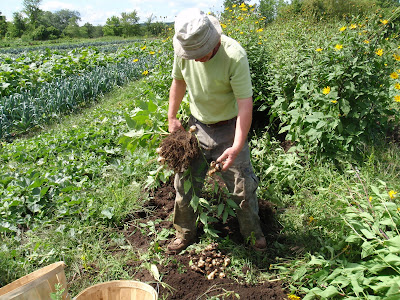
Contact the farm if you would like to purchase a cookbook ($20): 715-755-4690 or 715-294-4048.
Ever wonder how you'll ever be able to use all your vegetables? From Asparagus to Zucchini answers the question of what to do with your armloads of greens, herbs (and the never-before-seen vegetables), with recipes that are as concise and doable as they are appealing. Created for and by Community Supported Agriculture (CSA) members, the book is an indispensable tool for anyone who wants to eat seasonally and locally.
Organized by vegetable—fifty-three in all—each section includes nutritional, historical, and storage information, as well as cooking tips. With more than 420 original recipes created, tested, and enjoyed by chefs, CSA members, and farmers, you'll never be without a delicious recipe to make the most of the season's bounty. The best part is that lesser-known vegetables like burdock and kohlrabi have more recipes, not fewer!
From Asparagus to Zucchini is more than just a cookbook. Also included are essays that address the larger picture of sustainable agriculture, how our food choices fit into our economy, environment, and community, and more information on home food preservation and how to help kids appreciate—and even eat—their vegetables. Readers will find an extensive resource section and recipe index to round out this unique resource. With this book, prepare to awaken and reaffirm your dedication to enjoying the unique flavors of local foods while nourishing the life of sustainable family farms.


 Calling Everyone with an Interest in Gardening
Calling Everyone with an Interest in Gardening



